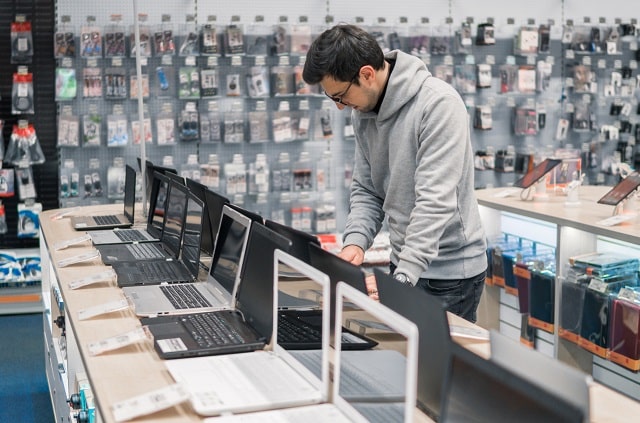
Before you spend money on a new computer, be sure it's the best choice for you! From laptops to desktops and Macs to Dells, the best computer for you is the one that best suits your needs.
With more features and new models seemingly all the time, it's hard to know where to start. Follow these seven tips to save you some hassle when buying a computer.
1. Stick to Your Budget
It's easy to buy more computer than you need if you don't stick to your budget. Computers go from affordable to expensive when you add more features and storage.
Set a price you can afford, then begin your search for the perfect computer. If you find you need a more expensive machine than fits your budget, consider computer financing. The right financing plan can help you get the best computer for your needs while you pay it off over time.
2. Determine Its Use
How do you intend to use your new computer? Is it a business purchase? Is it for gaming? Do you need it for small tasks like browsing the internet or watching movies?
Your intended use for a new computer helps you decide what type of computer best suits your needs. If you're a graphic designer or video editor, you need a lot of power and disk space, plus excellence graphics capabilities.
Gamers also need "big guns" when it comes to a powerful computer. Choose a system that can keep up with graphics and has plenty of memory.
If you need something for entertainment and browsing the web, consider a small laptop or tablet. You won't need as much computer as someone who requires a laptop or desktop for daily business needs.
A smaller computer that fits your needs can help you save money, too.
3. Choose Your OS
Your computer's operating system makes a difference in how useful your computer is for its intended use. While you can do a lot with any operating system, specific operating systems excel at different tasks.
The most common operating systems are Windows or the Mac OS. It's the age-old OS rivalry of "PC people" versus "Mac people."
- Windows continues to be the most popular operating system available. You'll find Windows desktops and laptops in most office spaces used in many capacities.
- The Mac operating system has gained more reliability and popularity in recent years. Because the Mac OS system can now do much of what a PC can do in terms of general business performance, Macs have become more commonplace around the office.
4. Desktop vs. Laptop vs. Tablet
Where will you use your computer most? If you don't need to carry a computer with you, a desktop is your best option. You can often save money on a desktop versus a laptop, depending on the desktop's configuration and if you already have a monitor.
However, with more businesses needing to operate on the go, your options for laptops are plenty. A laptop gives you a mobile office to work wherever you are.
Depending on your job responsibilities, a desktop might be all you need. Some people need a device they can take with them to write or give presentations. Others would rather leave work at the office, so a desktop is a perfect solution.
Size can also help you determine if a desktop, laptop, or tablet best suits your needs. A small laptop or tablet could be perfect for a busy person on the go or for someone who needs a portable device for around the house.
5. Don't Forget the RAM
If you need a computer that can handle more than one task at a time and needs to handle heavy graphics or files, you need more RAM.
Random Access Memory (RAM) is what makes a computer fast. It helps your system multi-task and keeps up with how fast you move between tasks before you complete something and save it the hard drive.
If you use your computer primarily for surfing the web and basic tasks, 4gigs of RAM should be all you need. Most people function well with 8gigs of RAM for work-related tasks, watching videos, and general gaming.
More RAM adds more costs to your computer. If you don't need a lot of speed, less RAM can save you some money on your system.
6. Select Your Storage
Do you work with big files, lots of photos, and large software programs? You'll need more storage on your computer.
Choose the laptop or desktop that has enough internal storage (or memory) for your needs. It's hard to find anything less than 64gigs anymore, but the latest computer models offer 256gigs with room to expand if you need more.
You can also add external storage drives if you outgrow the internal storage of your computer.
External drives are inexpensive and connect to your computer for smooth file transfer.
7. Check the Connections
Make sure your new computer connects to everything you need. Check for the ports that match your peripherals: Wifi, Bluetooth, USB, firewire, HDMI, or SD slot.
Newer model laptops have fewer ports these days. This design helps lighten a laptop and make room for more internal power.
Buying a Computer Can Be Fun!
If you've never bought a computer before, it's easy to get overwhelmed by the options and decisions.
However, if you know what to look for in a laptop, tablet, or desktop, buying a computer can be fun!
A new laptop or desktop can last several years. Keep up with OS updates and be careful when traveling with your laptop. You'll extend the life of your new computer by taking good care of it.
Did you find this article helpful? We hope so! Be sure to check more articles on business and technology for tips on being frugal!
